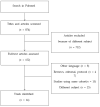Current Evidence of a Deintensification Strategy for Patients with HPV-Related Oropharyngeal Cancer
- PMID: 36010959
- PMCID: PMC9406155
- DOI: 10.3390/cancers14163969
Current Evidence of a Deintensification Strategy for Patients with HPV-Related Oropharyngeal Cancer
Abstract
Human papillomavirus (HPV)-related oropharyngeal cancer differs from HPV-negative oropharyngeal cancer in terms of etiology, epidemiology, and prognosis. Younger and lower comorbidity patient demographics and favorable prognosis allow HPV-related oropharyngeal cancer patients to anticipate longer life expectancy. Reducing long-term toxicities has become an increasingly important issue. Treatment deintensification to reduce toxicities has been investigated in terms of many aspects, and the reduction of radiotherapy (RT) dose in definitive treatment, replacement of platinum-based chemotherapy with cetuximab, response-tailored dose prescription after induction chemotherapy, and reduction of adjuvant RT dose after transoral surgery have been evaluated. We performed a literature review of prospective trials of deintensification for HPV-related oropharyngeal cancer. In phase II trials, reduction of RT dose in definitive treatment showed comparable survival outcomes to historical results. Two phase III randomized trials reported inferior survival outcomes for cetuximab-based chemoradiation compared with cisplatin-based chemoradiation. In a randomized phase III trial investigating adjuvant RT, deintensified RT showed noninferior survival outcomes in patients without extranodal extension but worse survival in patients with extranodal extension. Optimal RT dosage and patient selection require confirmation in future studies. Although many phase II trials have reported promising outcomes, the results of phase III trials are needed to change the standard treatment. Since high-level evidence has not been established, current deintensification should only be performed as part of a clinical study with caution. Implementation in clinical practice should not be undertaken until evidence from phase III randomized trials is available.
Keywords: chemotherapy; de-escalation; deintensification; human papillomavirus; oropharyngeal cancer; p16; radiotherapy; transoral surgery.
Conflict of interest statement
The authors declare no conflict of interest.
Figures
Similar articles
-
Consensuses, controversies, and future directions in treatment deintensification for human papillomavirus-associated oropharyngeal cancer.CA Cancer J Clin. 2023 Mar;73(2):164-197. doi: 10.3322/caac.21758. Epub 2022 Oct 28. CA Cancer J Clin. 2023. PMID: 36305841 Free PMC article. Review.
-
De-intensified adjuvant (chemo)radiotherapy versus standard adjuvant chemoradiotherapy post transoral minimally invasive surgery for resectable HPV-positive oropharyngeal carcinoma.Cochrane Database Syst Rev. 2018 Dec 14;12(12):CD012939. doi: 10.1002/14651858.CD012939.pub2. Cochrane Database Syst Rev. 2018. PMID: 30550641 Free PMC article.
-
Are we ready for deintensification in human papillomavirus-positive oropharyngeal carcinomas?Curr Opin Otolaryngol Head Neck Surg. 2023 Apr 1;31(2):118-128. doi: 10.1097/MOO.0000000000000871. Epub 2023 Jan 31. Curr Opin Otolaryngol Head Neck Surg. 2023. PMID: 36912224 Review.
-
Radiation Treatment Deintensification for HPV-Associated Oropharyngeal Cancer.Semin Radiat Oncol. 2021 Oct;31(4):324-331. doi: 10.1016/j.semradonc.2021.02.010. Semin Radiat Oncol. 2021. PMID: 34455987 Review.
-
Treatment deintensification in human papillomavirus-positive oropharynx cancer: Outcomes from the National Cancer Data Base.Cancer. 2018 Feb 15;124(4):717-726. doi: 10.1002/cncr.31104. Epub 2017 Dec 15. Cancer. 2018. PMID: 29243245
Cited by
-
What is the future of treatment de-escalation for HPV-positive oropharyngeal cancer? A review of ongoing clinical trials.Front Oncol. 2022 Dec 23;12:1067321. doi: 10.3389/fonc.2022.1067321. eCollection 2022. Front Oncol. 2022. PMID: 36620554 Free PMC article.
-
Management of Recurrent HPV-Positive Oropharyngeal Squamous Cell Carcinoma: a Contemporary Review.Curr Oncol Rep. 2023 May;25(5):501-510. doi: 10.1007/s11912-023-01386-5. Epub 2023 Mar 7. Curr Oncol Rep. 2023. PMID: 36881215 Review.
-
Prognostic Impact of Sarcopenia's Occurrence during Radiotherapy in Oropharyngeal Cancer Patients.Cancers (Basel). 2023 Jan 24;15(3):723. doi: 10.3390/cancers15030723. Cancers (Basel). 2023. PMID: 36765681 Free PMC article.
References
-
- Chaturvedi A.K., Engels E.A., Pfeiffer R.M., Hernandez B.Y., Xiao W., Kim E., Jiang B., Goodman M.T., Sibug-Saber M., Cozen W., et al. Human papillomavirus and rising oropharyngeal cancer incidence in the United States. J. Clin. Oncol. 2011;29:4294–4301. doi: 10.1200/JCO.2011.36.4596. - DOI - PMC - PubMed
-
- Damgacioglu H., Sonawane K., Zhu Y., Li R., Balasubramanian B.A., Lairson D.R., Giuliano A.R., Deshmukh A.A. Oropharyngeal Cancer Incidence and Mortality Trends in All 50 States in the US, 2001–2017. JAMA Otolaryngol. Head Neck Surg. 2022;148:155–165. doi: 10.1001/jamaoto.2021.3567. - DOI - PMC - PubMed
Publication types
Grants and funding
LinkOut - more resources
Full Text Sources


